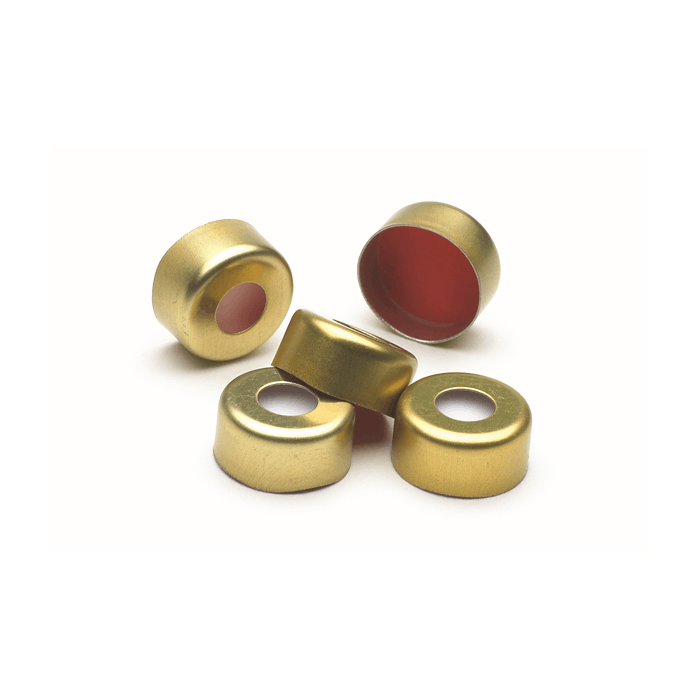
Agilent Crimp Caps
Crimp Caps from Agilent
Agilent recommends using Certified crimp caps with PTFE/silicone septa to ensure seamless operation with your Agilent autosampler. Agilent Certified crimp caps are guaranteed to work with your instrument to reduce autosampler malfunctioning and contamination.
Agilent crimp caps are 11 mm and designed with a wide opening to provide a larger target area for the autosampler. They come with a choice of either PTFE/silicone, PTFE/silicone/PTFE, PTFE/red rubber, PTFE/butyl, PTFE only, or viton septum materials. The crimp caps are secured to Agilent crimp vials with either Agilent manual crimpers, or Agilent electronic crimpers.
- Crimp caps provide additional security for food, forensics, and other applications for which you want to avoid sample tampering
- Crimp caps are recommended if you are working with volatile compounds
- Agilent septa are continually being improved to limit leaching, coring, sticking, push-through, hardness, and adsorption/absorption
- During manufacture, Agilent septa undergo thermal and chemical conditioning to reduce siloxane bleed, which can occur when the septa material is stressed during heating, solvent interaction, or piercing by the autosampler needle
- For highly sensitive samples, we recommend PTFE-lined (“sandwiched”) septa, because the PTFE layers act as a chemically resistant barrier
Use the chart below to determine the right cap and septa combination, based on your application.
| Thin PTFE | PTFE/Silicone* | PTFE/Silicone/PTFE* | PTFE/Red Rubber | Fluoroelastomer (Viton) | Butyl | |
| Temperature Range | up to 260 °C | -40 - 200 °C | -40 - 200 °C | -40 - 90 °C | -40 - 260 °C | -50 - 150 °C |
| Use for multiple injections | No | Yes | Yes | No | No | No |
| Price | Very economical | Economical | Most expensive | Very economical | Economical | Economical |
| Resistance to coring | None | Excellent | Excellent | None | None | None |
| Recommended for storage | No | Yes | Yes | No | No | No |
| Best for | Superior chemical inertness, short cycle times, and single injections | Most common HPLC and GC analyses, not as resistant to coring as P/S/P | Superior performance for ultra analysis, repeat injections, internal standards | Chlorosilanes, more economical option for single injections | Chlorinated solvents, higher temperatures | Organic solvents, acetic acids; impermeable to gases |
*Agilent silicone is peroxide cured, making it more inertand less likely to interact with samples

